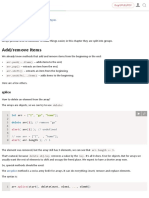0% found this document useful (0 votes)
12 views28 pagesArray
The document provides a comprehensive overview of the Array object in JavaScript, detailing its static and instance methods for creating, accessing, modifying, and manipulating arrays. It includes examples and explanations of various methods such as Array.from, Array.isArray, and methods for searching, filtering, and sorting elements. Additionally, it covers instance properties and conditions for evaluating elements within an array.
Uploaded by
ziad.srcCopyright
© © All Rights Reserved
We take content rights seriously. If you suspect this is your content, claim it here.
Available Formats
Download as PDF, TXT or read online on Scribd
0% found this document useful (0 votes)
12 views28 pagesArray
The document provides a comprehensive overview of the Array object in JavaScript, detailing its static and instance methods for creating, accessing, modifying, and manipulating arrays. It includes examples and explanations of various methods such as Array.from, Array.isArray, and methods for searching, filtering, and sorting elements. Additionally, it covers instance properties and conditions for evaluating elements within an array.
Uploaded by
ziad.srcCopyright
© © All Rights Reserved
We take content rights seriously. If you suspect this is your content, claim it here.
Available Formats
Download as PDF, TXT or read online on Scribd
/ 28























































































